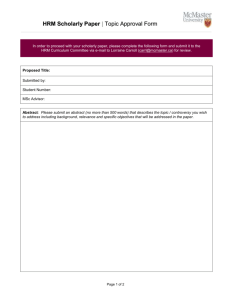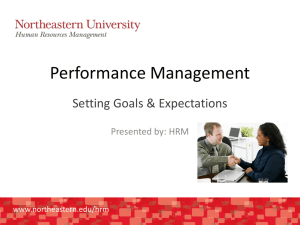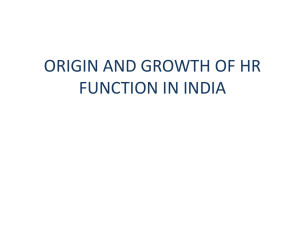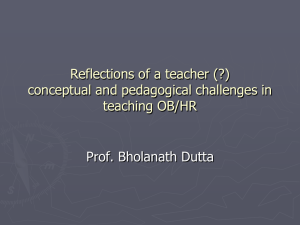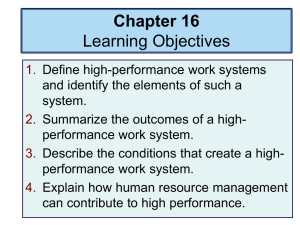Cross Cultural Human Resource Management
advertisement
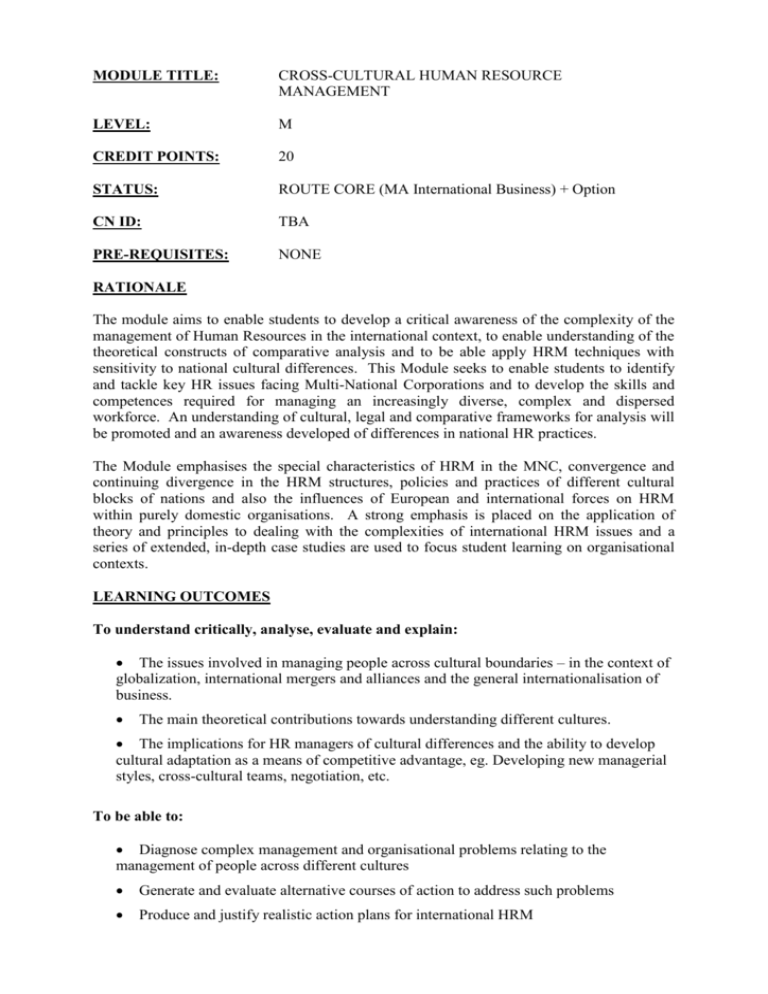
MODULE TITLE: CROSS-CULTURAL HUMAN RESOURCE MANAGEMENT LEVEL: M CREDIT POINTS: 20 STATUS: ROUTE CORE (MA International Business) + Option CN ID: TBA PRE-REQUISITES: NONE RATIONALE The module aims to enable students to develop a critical awareness of the complexity of the management of Human Resources in the international context, to enable understanding of the theoretical constructs of comparative analysis and to be able apply HRM techniques with sensitivity to national cultural differences. This Module seeks to enable students to identify and tackle key HR issues facing Multi-National Corporations and to develop the skills and competences required for managing an increasingly diverse, complex and dispersed workforce. An understanding of cultural, legal and comparative frameworks for analysis will be promoted and an awareness developed of differences in national HR practices. The Module emphasises the special characteristics of HRM in the MNC, convergence and continuing divergence in the HRM structures, policies and practices of different cultural blocks of nations and also the influences of European and international forces on HRM within purely domestic organisations. A strong emphasis is placed on the application of theory and principles to dealing with the complexities of international HRM issues and a series of extended, in-depth case studies are used to focus student learning on organisational contexts. LEARNING OUTCOMES To understand critically, analyse, evaluate and explain: The issues involved in managing people across cultural boundaries – in the context of globalization, international mergers and alliances and the general internationalisation of business. The main theoretical contributions towards understanding different cultures. The implications for HR managers of cultural differences and the ability to develop cultural adaptation as a means of competitive advantage, eg. Developing new managerial styles, cross-cultural teams, negotiation, etc. To be able to: Diagnose complex management and organisational problems relating to the management of people across different cultures Generate and evaluate alternative courses of action to address such problems Produce and justify realistic action plans for international HRM INDICATIVE CONTENT Understanding Culture Culture and globalisation Models and theories of culture Cultural analysis Internationalising management Managing MNCs International dimensions of work orientation Expatriation Human Resource Management Functions and Philosophy of HRM HRM strategies and practice Employee relations and participation Cross Cultural Issues – Topical research in cross-cultural HRM such as: New applications of theory Empirical developments in culture Current practice in international HRM SKILLS DEVELOPMENT Integrated skill development: The following skills will be developed within normal classroom sessions and within workshop activities: listening, questioning, challenging, influencing, analysing, problem solving, decision making, team working, etc. A strong emphasis is placed on the development of data gathering and research skills in preparation for the case study analysis, decision making and argument building. Independent and co-operative research and preparation skills will also be developed in out-of-class activities, preparing for class activities and for the examination case study. 1. 2. Intensive skill development: Class work will enable learners to focus on developing skills associated with presenting and making a persuasive case and, through class discussion, the skills of questioning, listening and debating will be enhanced. Role plays and cross-cultural negotiation exercises will feature and exercises in managing the performance of under-performing international staff will develop inter-cultural sensitivity and communication skills. THEMATIC DEVELOPMENT: The module focuses on the theme of Globalisation ASSESSMENT METHODS 1. Formative assessment will take place on an informal basis through feedback in class on individual and team activities and through the completion of work-book exercises 2. Summative, formal assessment will be by one time constrained (three hour) examination. The examination will comprise a pre-seen case study. The exam paper will require students to draw material from all relevant parts of the syllabus in order to deal with practical crosscultural problems related to the management of people. The assessment will provide the opportunity for students to demonstrate a critical knowledge together with analytical and conceptual skills in evaluating and dealing with complex issues in international HRM. Part of the specific requirements will also be pre-seen and distributed with the case study, whilst part will be given during the exam itself. Thus students will be able to analyse the case material and prepare for the examination in a focused way, with some scope for contingency planning in relation to the unseen part of the question. This presents a real-world management situation for the students in the examination. It gives the opportunity for students to demonstrate their analytical, conceptual and application skills in evaluating and dealing with complex issues in cross-cultural HRM, and tests their ability to provide practical recommendations and solutions to organisational issues. LEARNING METHODS The teaching and learning strategy will build upon students’ inter-dependent and independent learning skills and they will thus be expected to take a high degree of responsibility for their own learning. Forms of Learning: 1. Class-room based The module uses both lectures and small-group workshop/tutorials Lectures are used to provide a framework for the module and also give the opportunity for tutors and guest lecturers to share specialist expertise with the students. Workshops include problem solving and discussion based classes, utilising both case studies and, where possible, the students’ own organisational experiences. Practical exercises will also be used to develop skills, such as role play, negotiation, co-operative feedback and debriefing activities. In addition group work and project and research based exercises will be used. 2. Directed study The above, largely inter-active, class-room approach will be facilitated by students’ pre-reading of the Module learning support materials. A workbook/reader will be provided. Workbook tasks and activities encourage reflection on principles and theory and organisational data gathering to enable the application of theory and principles, will form an essential and substantial component of the student learning experience 3. Independent study Independent study will involve directed reading as specified within the learning support materials / workbooks complemented by access to audio and video recordings and the use of English language Web sites. INDICATIVE LEARNING RESOURCES Adler N. (1997) International Dimensions of Organizational Behaviour, 3rd Edition: Cincinnati,. Ohio: International Thompson Press. Bartlett, C. & Ghosall S. (1998) Managing Across Borders: The Transnational Solution, 2nd Edition, Boston: MA: Harvard Business School Press. Bratton, J. & Gold, J (2003) Human Resource Management : Theory and Practice, London: Macmillan. Bridgford J. & Stirling J. (1994) Employee Relations in Europe, Oxford: Blackwell Dowling, P.& Welch D. (2004) International Human Resource Management, 4th Edition, International Thompson Press. Harzing A-W. & Van Ruysseveld J. (Eds) (1995) International HRM, London: Sage Hofstede, G. (2001) Culture's Consequences: Comparing Values, Behaviors, Institutions and Organizations Across Nations, 2nd Ed., London: Sage. Hollinshead, G. & Leat, M. (1995) HRM – An International Comparative Perspective, London: Pitman Guirdham M. (1999) Communicating Across Cultures, London: MacMillan Jackson T. (2002) International HRM: a Cross-Cultural Approach, London: Sage Joynt, P. & Morton B. (Eds) (1999) The Global HR Manager, London: IPD Perkins S. (1997) Internationalization: The people dimension, London: Kogan Page Trompenaars F. & Hampden-Turner C. (1997) Riding the Waves of Culture, London: Nicholas Brearley KEY JOURNALS Cross Cultural Management: An International Journal Employee Relations Human Resource Management International Journal of HRM Personnel Review Students will be provided with a focused reading guide around the module syllabus.


